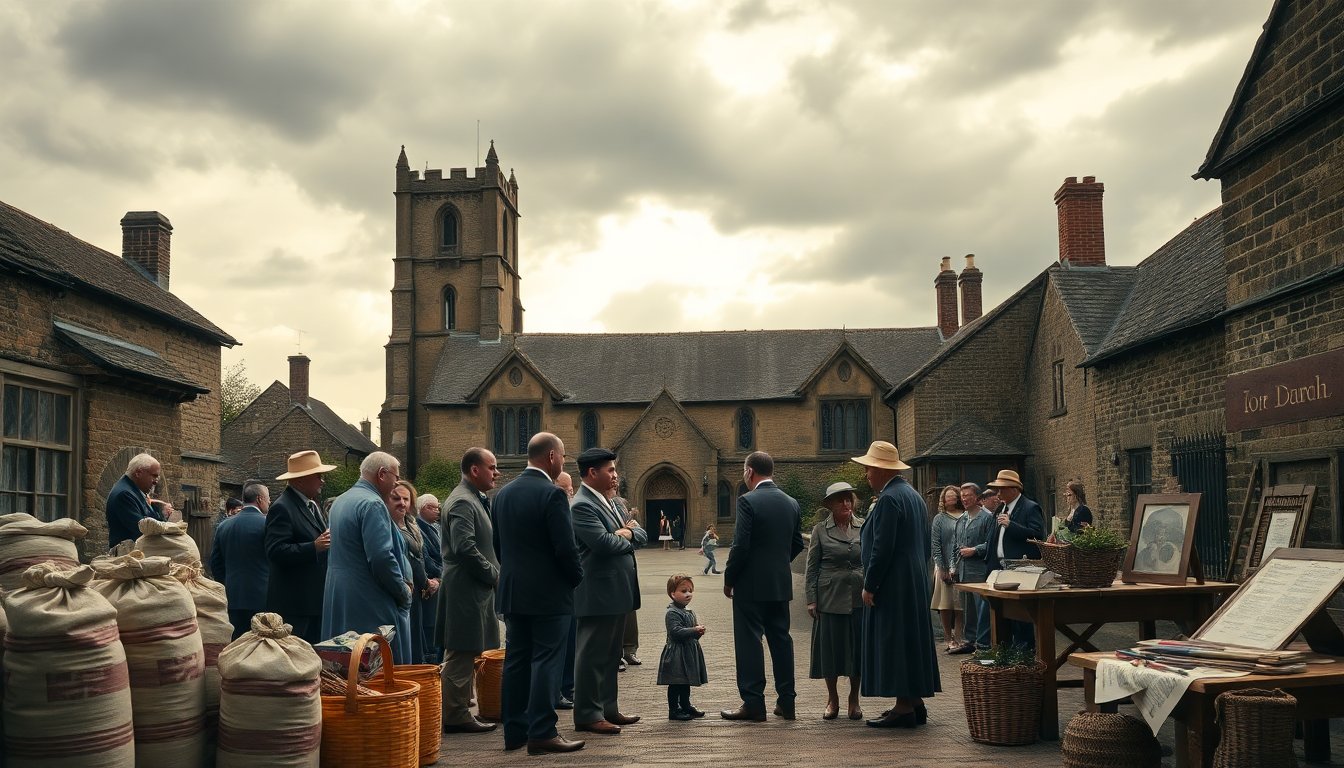Table of Contents
In a notable collaboration between writer Alan Bennett and director Nicholas Hytner, the film ‘The Choral’ presents a new perspective on the familiar narratives of World War I. Set in a quaint English village, this story contrasts the comforting notions of wartime resilience with a deeper exploration of artistic integrity. This film represents Bennett’s first original screenplay in four decades, highlighting a range of personal and societal complexities.
The film opens with a lively scene where a village choir enthusiastically sings the national anthem, ‘God Save the King.’ This moment establishes the tension between national pride and the pursuit of artistic expression, embodied by the choir’s choirmaster, Dr. Henry Guthrie, portrayed by Ralph Fiennes. His disdain for the choir’s raucous singing indicates a critical stance on blind patriotism, emphasizing that art holds greater significance than mere allegiance to the crown.
Setting the stage: a fictional Yorkshire town in turmoil
The narrative unfolds in the fictional Yorkshire mill town of Ramsden in 1916, a place seemingly untouched by the ravages of war, yet deeply affected by the draft’s toll on its young male population. As the train station witnesses a steady stream of departures, the optimism of the recruits quickly fades upon their return, often marked by trauma and loss. Among them is Lofty, a 17-year-old postboy who delivers grim news to grieving families while grappling with his own impending conscription.
Lofty’s friend, Ellis, offers a contrasting outlook on their plight, suggesting that grief opens up new opportunities. This camaraderie reflects the youthful desires and dreams that persist even amid despair, as the boys turn their attention to the village choir, which is in need of male voices due to the draft.
Guthrie: A complex character in a conservative setting
Enter Dr. Henry Guthrie, whose sophisticated background and unconventional lifestyle make him a controversial figure among the villagers. His past, marked by years spent in Germany and his open atheism, fuels the discontent of local board members, particularly Duxbury, who prefers a more conventional family man at the helm. The film subtly hints at Guthrie’s sexuality, presenting a character whose emotional depth and artistic aspirations are stifled by societal norms.
As the narrative unfolds, Bennett skillfully navigates the romantic entanglements of the younger characters, who are caught in the throes of adolescence and the looming specter of war. Their quest for love and intimacy serves as a poignant contrast to the harsh realities of their world, with characters like Mary, a Salvation Army officer, and Bella, a spirited young woman awaiting her wounded boyfriend’s return.
Thematic depth: art versus nationalism
Bennett’s screenplay oscillates between the perspectives of various characters, providing a rich tapestry of experiences that reflect the era’s complexities. While the primary plot revolves around the choir’s ambitious attempt to perform Elgar’s ‘The Dream of Gerontius’, it is the underlying themes of aspiration and integrity that resonate most profoundly. The film offers a more realistic portrayal of artistic endeavors, eschewing the typical narrative arc of triumphant success.
One particularly memorable moment occurs when Simon Russell Beale makes a brief yet impactful appearance as Elgar, delivering a dose of realism that undercuts the film’s more romanticized aspirations. This moment serves as a reminder that the journey toward artistic achievement is fraught with challenges and compromises.
Confronting expectations with authenticity
What distinguishes ‘The Choral’ is its willingness to defy expectations of light-hearted British cinema. While the film is visually stunning, thanks to the cinematography of Mike Eley and the lush score by George Fenton, it also delves into the darker aspects of human experience. The lone intimate scene between Lofty and a partner is portrayed with tenderness, reflecting the emotional scars left by war and societal repression.
Ultimately, ‘The Choral’ challenges viewers to reconsider the narratives of war and art, revealing the profound impact of personal integrity and the human spirit amidst chaos. Bennett’s writing cuts through the veneer of nostalgia, offering a raw and authentic portrayal of life in wartime Britain.


